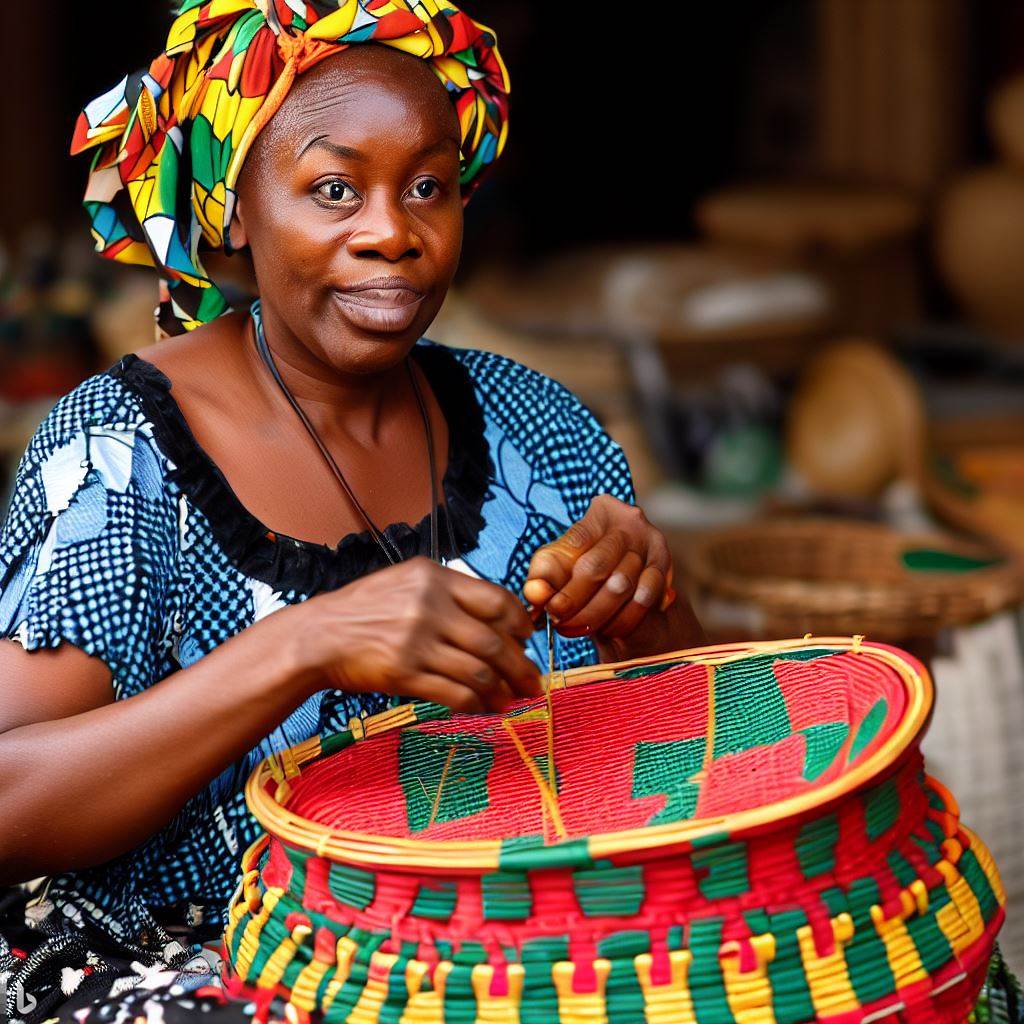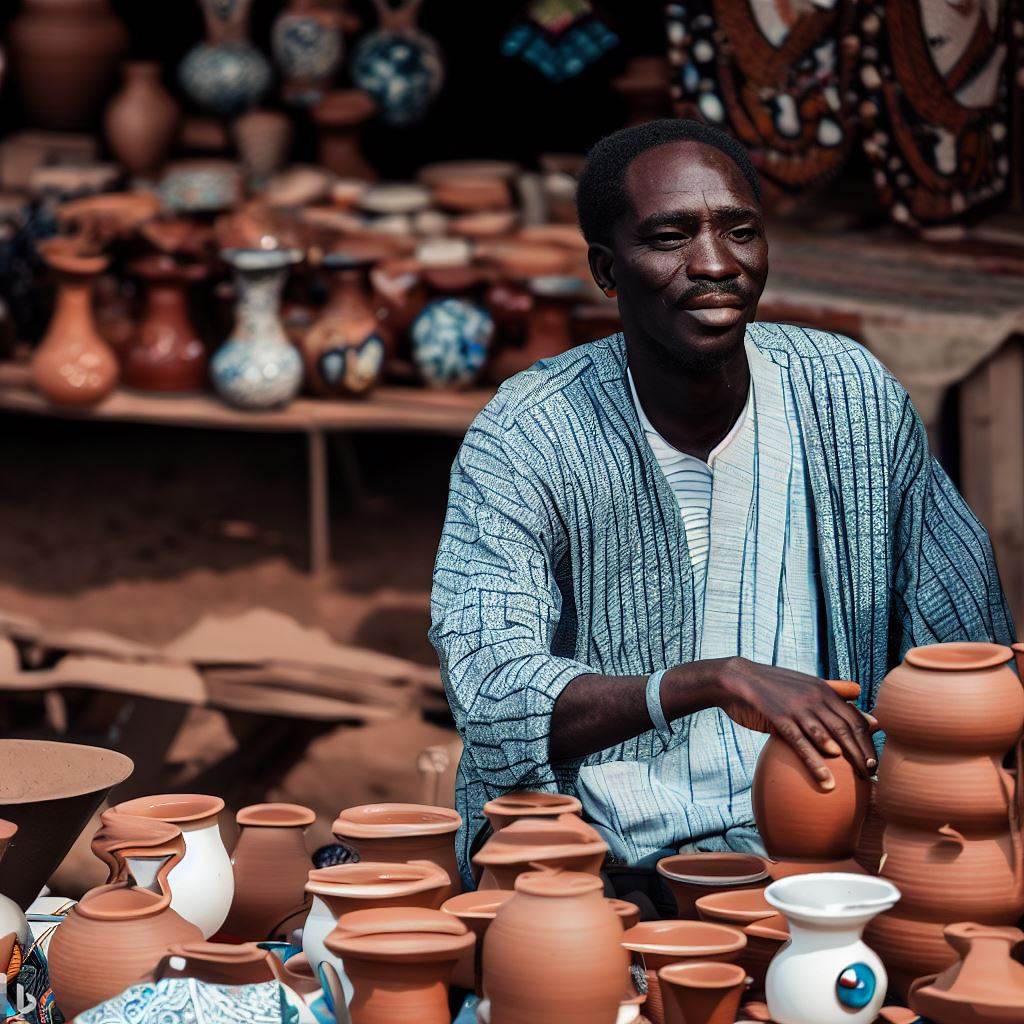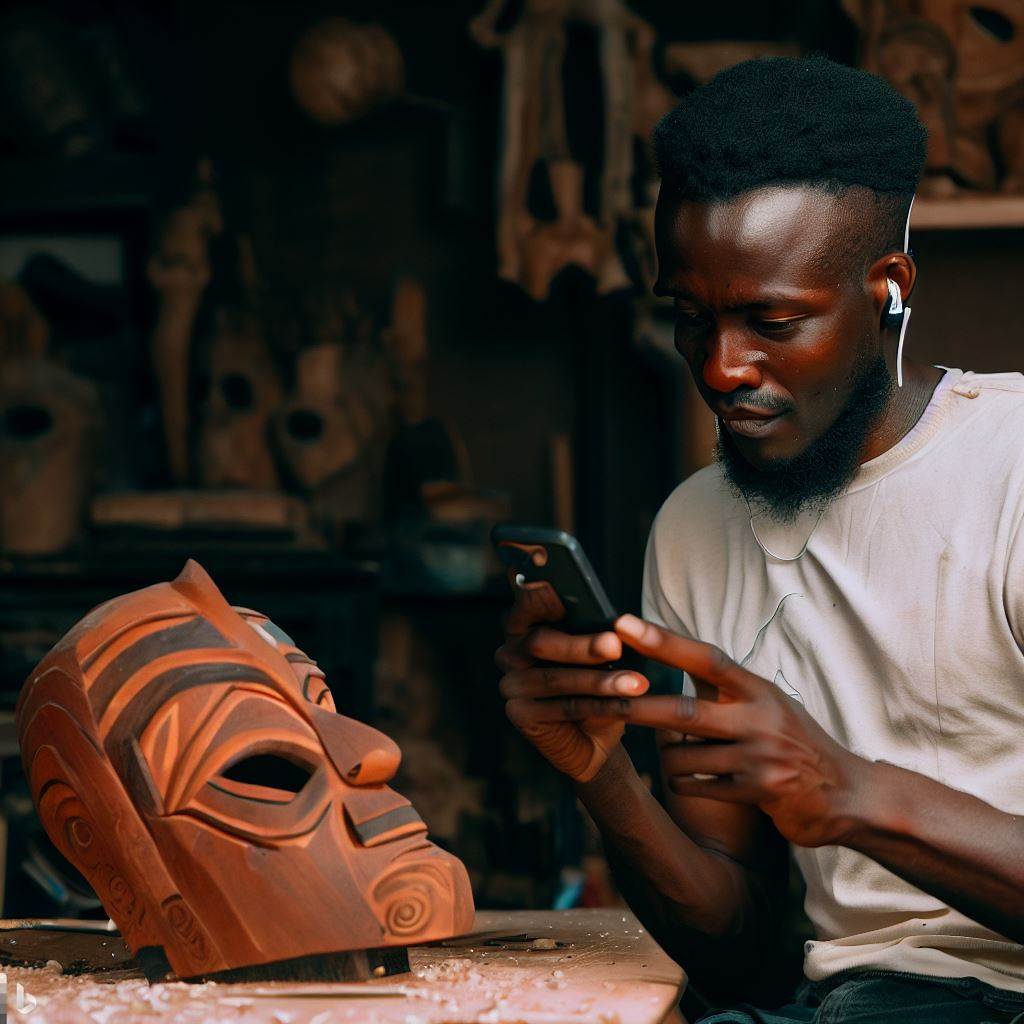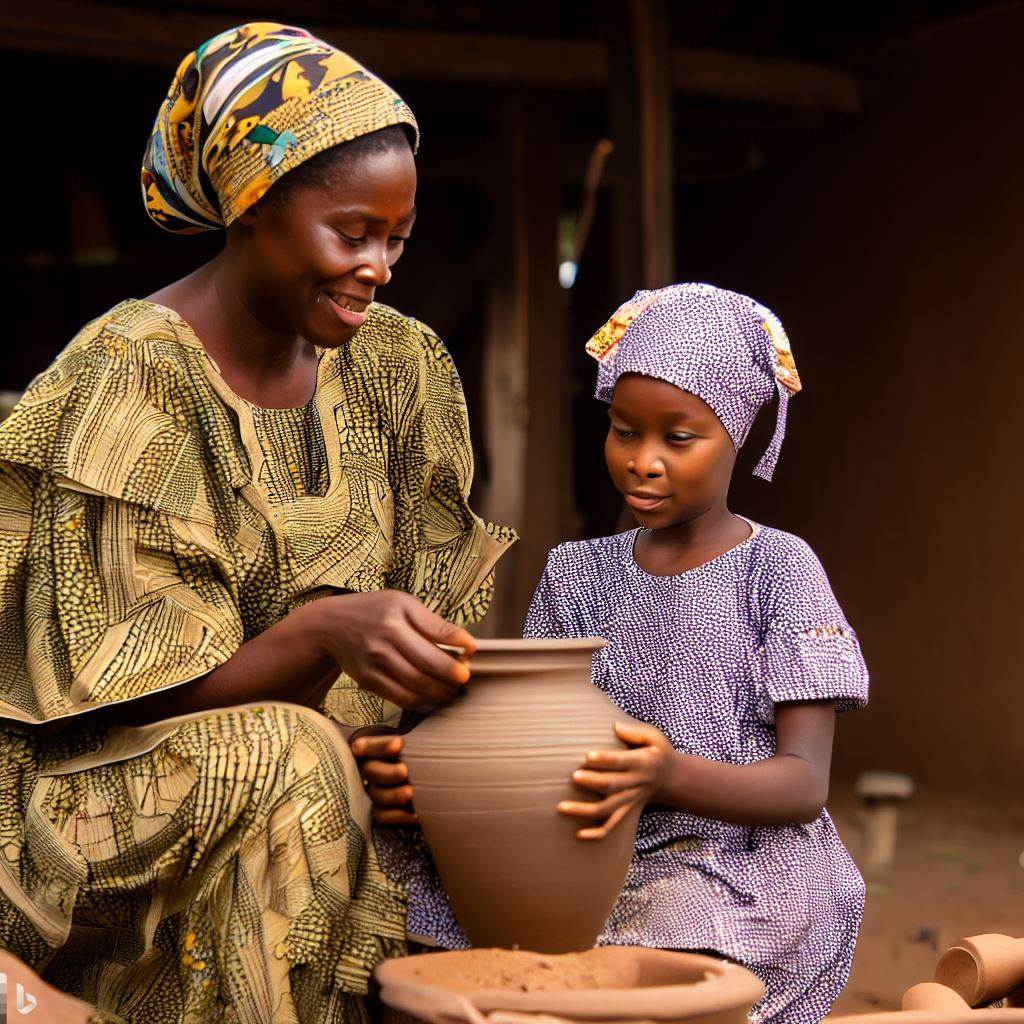Introduction
Craftsmanship refers to the skill of creating or producing high-quality and unique items that are functional and aesthetically pleasing.
Craftsmanship is an integral part of Nigeria’s cultural heritage, as it provides a means for showcasing the country’s diverse artistic traditions and practices.
Nigeria’s cultural heritage is incredibly rich and diverse, comprising various art forms, including pottery, basket weaving, wood carving, beadwork, and sculpture.
Craftsmanship is paramount in preserving Nigeria’s cultural heritage and passing it on to future generations. Furthermore, it is a source of employment and income for many Nigerians, particularly those in rural areas.
Craftsmen and women play a crucial role in sustaining Nigeria’s cultural heritage, and their work reflects the ingenuity, creativity, and finesse that are unique to Nigerian craftsmanship.
In essence, the importance of craftsmanship in Nigeria’s cultural heritage cannot be overstated. It is a symbol of pride, identity, and national unity and should be celebrated and supported at all times.
Brief History of Craftsmanship in Nigeria
Traditional Craftsmanship in Pre-Colonial Times
Craftsmanship has been an essential part of Nigerian culture for centuries. Pre-colonial craftsmen created various objects that incorporated their skills, talents, and traditions. These artisans produced beautiful, intricate works of art that symbolized Nigerian culture and identity.
Some of the popular ancient crafts in Nigeria included pottery, weaving, carving, and textile-making. These artisans would usually work with locally sourced materials like clay, wood, and fibers to create unique pieces that depicted Nigerian heritage.
Impact of Colonialism on Craftsmanship
During the colonial era, Nigerian craftsmanship experienced a significant decline as colonial powers introduced modern products to the Nigerian market. Foreign imports took over the local industry, and many traditional craftsmen found themselves out of work.
This led to a loss of cultural identity and heritage as Nigeria became more westernized. However, this period also saw the emergence of new crafts like metalworking, leatherworking, and tailoring, which incorporated western techniques.
Some craftsmen also adapted traditional crafts to suit the modern market. This allowed the industry to stay relevant and preserve some Nigerian cultural heritage.
Modern-Day Craftsmanship in Nigeria
In recent times, there has been a resurgence of interest in Nigerian craftsmanship. Modern-day craftsmen are turning to ancient craftsmanship techniques to create unique modern pieces that celebrate Nigerian heritage. This has created a new market for Nigerian crafts, both locally and internationally.
Nigeria now boasts a thriving crafts industry, with artisans specializing in various crafts like bead-making, pottery, basket weaving, and textile-making.
The industry also provides employment opportunities for the youth and contributes to the growth of the Nigerian economy.
In summary, Nigerian craftsmanship plays a significant role in preserving the country’s cultural heritage. Although the industry has faced challenges, it has adapted and evolved over time.
Nigerian crafts continue to capture the essence of Nigerian identity and provide a means of livelihood for many people. As such, it is crucial to promote and support the industry, not just for its economic value, but also to safeguard the cultural legacy of Nigeria for future generations.
Read: Mastering Trade Skills: A Path to Employment in Nigeria
Different Types of Craftsmanship in Nigeria
Craftsmanship has long been an integral part of Nigerian culture. It has been passed down from generation to generation and is considered a rich cultural heritage. Here are some of the different types of craftsmanship in Nigeria:
Textile and Weaving
Textile and weaving have been an essential part of Nigerian culture for centuries. The country is well-known for its beautiful fabrics, including adire, aso-oke, and ankara.
The fabrics are typically made using cotton or silk and are decorated with intricate designs, including patterns and symbols that represent the local culture.
Pottery and Ceramics
Nigeria is also well-known for its pottery and ceramics. These crafts are typically made using locally sourced materials and are often decorated with symbols representing the local culture.
Some of the most famous pottery and ceramics in Nigeria include the Nok terracotta sculptures, which are over 2,000 years old.
Woodcarving
Woodcarving is another popular craft in Nigeria and is used to create sculptures, masks, and other decorative items. The craft is typically practiced by men who have been trained from a young age in the art of woodcarving.
The woodcarvings are often decorated with intricate designs and symbols that have significant cultural meaning.
Leatherworks
Leatherworks are another essential part of Nigerian craftsmanship. The craft is typically practiced by the Fulani and Hausa people who have been practicing the art of leatherworking for centuries.
The leather is typically dyed using locally sourced materials and is then used to create items such as bags, shoes, and belts.
Bead-Making
Bead-making is a popular craft in Nigeria and is used to create beautiful jewelry and other decorative items.
The craft is typically practiced by women who have been trained from a young age in the art of bead-making. The beads are made using a variety of materials, including glass, coral, and shells.
Metal Works
Metal works are also an essential part of Nigerian craftsmanship. The craft is typically practiced by men who have been trained from a young age in the art of metalworking.
The metal is typically sourced locally and is used to create items such as jewelry, sculptures, and utensils.
Overall, craftsmanship continues to be an integral part of Nigerian culture, and the different types of crafts are a testament to the country’s rich cultural heritage.
Read: Success Stories: Nigeria’s Notable Craftsmen

The Economic Importance of Craftsmanship in Nigeria
Artisans and craftsmen in Nigeria have played a significant role in sustaining the country’s economy. Their products have become an essential part of the nation’s cultural heritage and have gained recognition both locally and internationally. This section will explore the economic benefits of craftsmanship in Nigeria.
Job Creation
One of the most significant economic benefits of craftsmanship is job creation. The craftsmanship industry in Nigeria provides employment opportunities for thousands of people, including both skilled and unskilled laborers.
The production of handicrafts requires many stages, which include the sourcing of raw materials, designing, production, marketing, and distribution.
Each stage of the process provides employment opportunities for Nigerians, which contributes to reducing the country’s unemployment rate.
Empowerment of Artisans
Many artisans in Nigeria are self-employed and own their small businesses. The creation and sale of handicrafts empower them, providing them with financial independence.
They can earn a living by using their skills and creativity to produce unique products.
The money they make from their businesses provides them with the resources needed to support their families and improve their standard of living.
Promotion of Tourism
Craftsmanship plays a crucial role in promoting tourism in Nigeria. Tourists are drawn to Nigeria to explore its cultural heritage, and handicrafts play an essential part in showcasing this heritage.
The production of handicrafts by local artisans gives tourists a glimpse into Nigerian culture and traditions by offering them a tangible piece of Nigerian heritage to take home as a souvenir.
The sales of handicrafts to tourists also provide Nigerian artisans with access to an international market.
In addition, craftsmanship is an important part of Nigeria’s economic and cultural heritage. The production and sale of handicrafts provide employment opportunities and financial empowerment for artisans, while also promoting tourism.
Supporting the craftsmanship industry in Nigeria can improve the country’s economy and cultural diversity.
Read: Emerging Trade Skills Trending in Nigeria Today
The Cultural Significance of Craftsmanship in Nigeria
Craftsmanship plays an integral role in Nigeria’s cultural heritage, serving as a testament to the country’s rich history and traditions.
This section will explore the cultural significance of craftsmanship, highlighting how it preserves traditional African arts, reinforces Nigerian identity, and plays a vital role in festivals and ceremonies.
Preservation of Traditional African Arts
Craftsmen and women pass down unchanged techniques and skills for centuries, preserving diverse traditional African arts like weaving and pottery. Craftsmanship ensures the arts endure.
Craftsmanship promotes the continuation of traditional African arts by incorporating them into modern designs. It allows artisans to preserve cultural practices while adapting them to contemporary aesthetics.
By merging traditional and modern practices, craftsmanship ensures that Nigeria’s cultural heritage is kept alive while also allowing it to evolve and remain relevant.
Reinforcement of Nigerian Identity
Craftsmanship is an essential component of Nigeria’s identity, representing the country’s unique cultural heritage. The use of traditional African materials, such as wood, beads, and woven fabric, in crafted items, helps to showcase and celebrate the country’s diverse cultural makeup.
Craftsmanship also serves as a means for Nigerians to express their identity and pride in their culture. The market for Nigerian crafts is not just limited to the country’s citizens, but also to the global market.
This demand for handcrafted items has created opportunities for craftsmen and women to showcase their art and gain recognition for their work, reinforcing Nigeria’s identity on a global platform.
Role of Craftsmanship in Festivals and Ceremonies
Festivals and ceremonies are an integral part of Nigerian culture, with many events featuring traditional African arts and crafts. These events provide a platform for artisans to showcase their work and promote the continued appreciation of traditional African arts.
Craftsmanship plays a vital role in festivals and ceremonies, with many items created explicitly for these occasions. These items include masks, sculptures, costumes, and musical instruments, which serve as a representation of Nigerian culture and create a sense of pride and identity amongst the country’s citizens.
Exposing traditional African arts to a wider audience inspires the youth to continue these practices, preserving Nigeria’s cultural heritage.
Craftsmanship in Nigeria reinforces identity, plays a vital role in festivals, and must be appreciated globally.
Read: Exploring the Rich History of Craftsmanship in Nigeria
Challenges Facing Craftsmanship in Nigeria
Nigeria’s cultural heritage is rich and diverse, and craftsmanship has played a vital role in preserving it over the centuries. However, despite the importance of this sector, it faces many challenges that hinder its growth and development.
In this section, we will explore some of the challenges facing craftsmanship in Nigeria and how they can be addressed.
Lack of Government Support
Craftsmanship in Nigeria is largely an informal sector, with most craftsmen working independently or in small groups. This makes it difficult for them to access the necessary resources and support to improve their skills and products.
Additionally, the government has not been proactive in providing financial and technical support to artisans, which has resulted in a stagnation of creativity and productivity.
- Lack of funding for training, research and development
- Absence of regulatory institutions to set standards and enforce quality control measures
- Poor infrastructure and inadequate access to basic amenities such as electricity and water
- Lack of incentives such as tax holidays and import duty waivers
To address these challenges, the government needs to invest in capacity building for craftsmen, support the establishment of regulatory bodies and provide basic infrastructure to enhance productivity.
Lack of Access to Marketable Platforms
One of the biggest challenges facing craftsmen in Nigeria is the lack of access to viable marketing platforms to sell their products. With the advent of e-commerce and online marketplaces, the demand for traditionally handmade products has declined, leaving many artisans struggling to make ends meet.
- Lack of awareness and knowledge of modern marketing techniques
- Difficulty in accessing international markets due to trade barriers, cultural differences, and language barriers
- Inability to compete with mass-produced, machine-made products in terms of price and volume
To address this challenge, craftsmen need support in developing marketing strategies and gaining access to online and offline marketing platforms.
The government can also play a role in streamlining trade agreements with other countries, providing training and language support, and engaging in cultural exchange programs to promote Nigerian craftsmanship.
Competition from Foreign Products
Another challenge facing Nigerian craftsmen is competition from foreign products. With globalization and free trade policies, artisans are exposed to competition from cheap, mass-produced goods from other countries.
- Difficulty in maintaining quality standards and pricing models that are competitive with foreign products.
- Lack of access to modern manufacturing technologies that can enhance productivity and improve quality
- Difficulty in protecting intellectual property rights and preventing the sale of counterfeit products
To address this challenge, craftsmen need support in the form of education and training to adopt modern manufacturing technologies and improve quality standards.
The government can also play a role in negotiating trade policies that protect and promote domestic products and create incentives for manufacturers to adopt sustainable and ethical production practices.
Essentially, addressing the challenges facing craftsmanship in Nigeria requires a concerted effort from all stakeholders, including craftsmen, policymakers, and society. Ultimately, strengthening the sector can help preserve Nigeria’s rich cultural heritage and promote economic growth and sustainable development.
Conclusion
Recapping the importance of craftsmanship in Nigeria, it is evident that it serves as the backbone of the country’s cultural heritage. The traditional crafts of Nigeria hold great significance and continue to sustain the livelihoods of many Nigerians.
It is necessary for individuals and organizations to lend support and aid in the preservation of Nigerian crafts. This is essential in maintaining the authenticity and uniqueness of these traditional crafts while simultaneously empowering and promoting the growth of craftsmen within Nigeria.
Finally, it is crucial to acknowledge the immense potential and value in the skills and creativity of Nigerian craftsmen. By placing a significant emphasis on the preservation and promotion of Nigerian crafts, we can celebrate the rich cultural heritage of the country while fostering sustainable economic growth.




